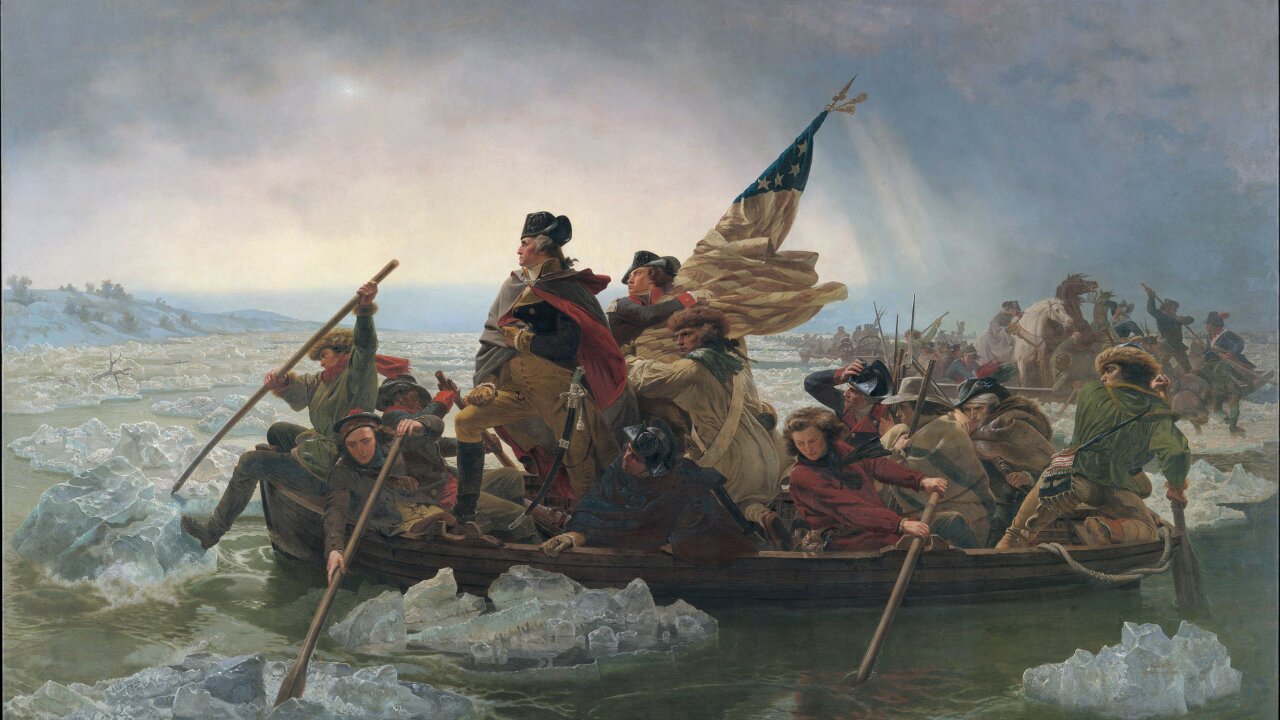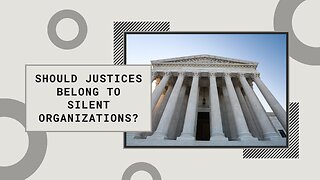Premium Only Content

Washington did the impossible
Washington did the impossible
By Terry A. Hurlbut
Two hundred forty-seven years ago this morning, the Continental Army, General George Washington commanding, ambushed a large force of Hessian mercenaries in the Battle of Trenton. Not only did the Continental Army win a stunning victory, but morale, which had suffered greatly in the half-year following the Declaration of Independence, climbed high enough to sustain the war effort at a crucial time. But to bring this about, Washington had to do two things no one, friend or foe, would have suspected. He attacked in the middle of winter – and in those days, armies did not fight in winter. But before then, he and his army had to cross an ice-cold river – the Delaware. His advisers told him he couldn’t do it – because no one could – but he did it anyway. That one act made the difference between victory and defeat.
What Washington faced
The Continental Army probably never had any of the advantages an army guarding an established society enjoys. “Not worth a Continental” was a common saying then, and it referred to the new country’s currency. So pay in the Continental Army was hit or miss.
British forces under General William Howe had chased Washington out of New York that summer and fall, taking many prisoners. Those that escaped – going as far as Pennsylvania – were already demoralized. Many of their mates had deserted or simply “not re-upped” when their enlistments expired. Worse, two of his generals – Horatio Gates and Charles Lee – evidently preferred to argue with and disobey him. (Even one bad general can defeat two or more good generals who argue.)
But on December 19 can an event that demonstrates the value of propaganda in boosting troop morale. Thomas Paine (Common Sense) published his American Crisis pamphlet. This pamphlet begins with this salient quote:
These are the times that try men’s souls: the summer soldier and the sunshine patriot will, in this crisis, shrink from the service of his country; but he that stands it now, deserves the love and thanks of man and woman. Tyranny, like hell, is not easily conquered; yet we have this consolation with us, that the harder the conflict, the more glorious the triumph. What we obtain too cheap, we esteem too lightly.
Apart from the universal truth of that statement, Paine, in those words, gave Washington what he needed most: a moral-philosophical doctrine to remind his troops of what victory would require. He ordered his officers to read that to his troops – and they took the hint.
The troops gather
Washington had made his camp near McConkey’s Ferry, across and slightly upriver from Trenton. On December 20, General Charles Lee’s division arrived. That arrival is interesting in itself, because it had come about from a change of command. Charles Lee had ventured beyond the protection of his troops, and the British had captured him. General John Sullivan took command and followed Washington’s original order to join him.
General Gates’ division was not so large – only 600, net of enlisted who didn’t “re-up.”But 1000 militiamen soon joined the gathering force. With so many forces now available to him, Washington decided to attack. He sent his Adjutant General, Joseph Reed, to cross the river alone and meet with militiamen stationed near Mount Holly, New Jersey. Reed found a force of troops in poor condition, and signaled that an assault at Mount Holly would likely fail. So Washington decided to attack the Trenton garrison directly. But those Mount Holly militiamen did create a crucial diversion – the Battle of Iron Works Hill, on December 23. That battle drew some Hessians away from Trenton – and the rest never expected any further action.
The crossing and the attack
That’s because the Hessians (and the British) never expected any general to try to cross a major river, and bring artillery and cavalry as well as infantry, unless the river were frozen over first. In fact, Washington’s spies reported the suspicion that the British would try to cross when the river was frozen over. So on the night of Christmas Day, Washington took his army across – or at least part of it. (Of the other two parts, one didn’t cross at all. The other cross, but after the battle was over and Washington had already recrossed into Pennsylvania.)
But Washington made it across with his largest contingent of troops, including cavalry horses and artillery pieces. Here the famous Marblehead Rowers earned their fame: all night long they rowed, to ferry Washington’s troops and materiel across. The last of the artillery pieces made it across at 3:00 a.m. At 4:00 a.m. the army was ready to march.
Once they were ready, Washington split his army into two columns and thus attacked Trenton from two directions. To add to the complete surprise, the postmaster of Trenton, Abraham Hunt, who had pretended to be a Loyalist, entertained the British commander and some of his officers at his house. Likewise, the Trenton garrison were celebrating Christmas – and Washington caught them completely unaware and unprepared.
The Continentals suffered very light casualties: three killed and six wounded. They took a far heavier toll on the enemy: 22 killed, 98 wounded, and nearly 1000 captured.
Washington goes back across – and then back for more
Now Washington had to bring his troops – and those prisoners, and the large quantity of supplies they had also captured – back across to Pennsylvania. To make things more difficult, his troops had captured several casks of rum during the battle. Instead of destroying them, many of the troops drank it up – with predictable results during the recrossing.
Still, Washington succeeded in the recrossing. The next day he heard that the British and Hessians had retreated to Princeton. So he took his entire force back across the Delaware, though he couldn’t complete the crossing until New Year’s Eve. The enemy attacked him at Assunpink Creek on January 2, 1777, but without success. The next day he attacked Princeton and chased the British away. So the Continental Army wintered in Morristown, New Jersey that year.
This time the losses struck a little closer to home: Washington’s personal friend Hugh Mercer died in that operation. To this day the State of New Jersey remembers him: the country that includes Trenton is called Mercer County.
Incredibly, Abraham Hunt created such confusion that he stood trial for Loyalist sentiment! The court acquitted him on the testimony of several Patriots who attested to the crucial role he played at Trenton.
Lessons learned
The American people can take several lessons from the campaign that began with Washington crossing the Delaware. First, of course, is Thomas Paine’s lesson, which the Continental Army put into practice. Second is the importance of follow-up. Whoever wins a victory and then fails to follow up on it, wastes it. Third is the importance of unity of command – and understanding that, when the commanding general cuts an order, he’s thought about it, and it’s best to obey it.
But the most important lesson is never to assume that anything is impossible – either for yourself or for your adversary. The British learned that the hard way – and the Americans learned it, again, by practicing the lesson.
Sadly, Thomas Paine’s other lesson also applies. “What we obtain too cheap, we esteem too lightly,” he said – and that goes double for a legacy. The day might indeed come when Americans have to pay as high a price for liberty as Washington and his troops paid.
Link to:
The article:
https://cnav.news/2023/12/26/foundation/constitution/washington-did-impossible/
Thomas Paine’s The American Crisis:
https://americainclass.org/sources/makingrevolution/war/text2/painecrisis1776.pdf
Declarations of Truth X feed:
https://twitter.com/DecTruth
Declarations of Truth Locals Community:
https://declarationsoftruth.locals.com/
Conservative News and Views:
https://cnav.news/
The CNAV Store:
https://cnav.store/
Clixnet Media
https://clixnet.com/
-
 20:36
20:36
Declarations of Truth
21 days agoRoberts CJ in a judicial silent organization?
166 -
 16:18
16:18
Mrgunsngear
12 hours ago $22.64 earnedBlack Aces Tactical S4 Tactical - Benelli M4 Clone But Does It Work?
110K5 -
 32:55
32:55
The Connect: With Johnny Mitchell
1 day ago $4.63 earnedInside America's LARGEST Pot Trafficking Gang: How Florida Fishermen Became #1 Most Wanted Cartel
49.7K9 -
 2:05:15
2:05:15
Right Side Broadcasting Network
13 hours agoLIVE REPLAY: President Trump Attends UFC Fight 314 - 4/12/25
129K14 -
 2:07:42
2:07:42
BlackDiamondGunsandGear
12 hours agoWho’s in Town for This Stream?
71.6K5 -
 1:24:56
1:24:56
Quite Frankly
22 hours ago"Wild Tales: Crazy Story Hotline" | The Brothers Ep. 1
101K15 -
 12:37
12:37
Tundra Tactical
18 hours ago $6.48 earned🚫🚫 Biden Era GUN CONTROL Gone!!!! 🚫🚫
76.9K20 -
 1:00:09
1:00:09
Motherland Casino
11 hours ago $7.03 earnedCynthia X Mia
66.9K7 -
 5:32:47
5:32:47
BubbaSZN
17 hours ago🔴 LIVE - BUBBA PLAYS WARZONE SEASON 3
46.8K2 -
 2:29:26
2:29:26
Mally_Mouse
17 hours agoSaturday Shenanigans!! - Let's Play: REPO
62.5K14